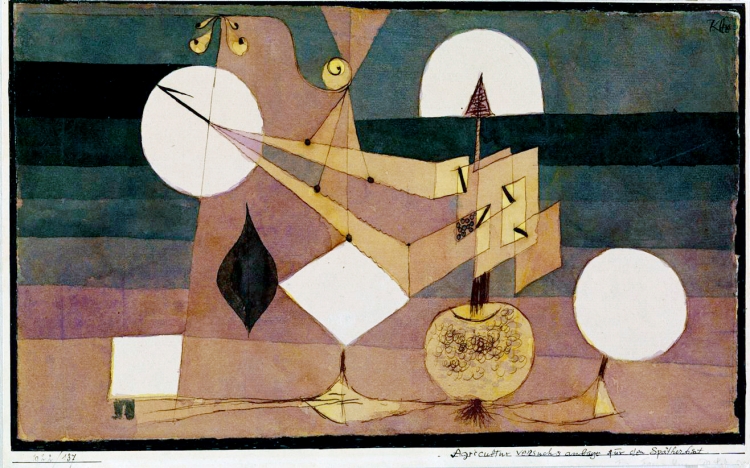
By
The McMullen Museum of Art’s current exhibition examines the work of Swiss-born artist Paul Klee (1879–1940), whose art influenced prominent 20th-century European philosophers like Martin Heidegger and Michel Foucault.
“Paul Klee: Philosophical Vision; From Nature to Art,” which opened Sept. 1 and runs through Dec. 9, is the first exhibition to focus on the relationship between philosophy and Klee’s prolific artistic oeuvre, and to reveal the broad impact the artist has had on recent philosophical thought.
The exclusive show and accompanying catalogue demonstrate how Klee’s groundbreaking theories — of nature, words, and music as developed in his writings and lectures — are translated into form, line, and color in his works of art, and reveals Klee as an astute critic of modern society, especially with regard to the impact of technology and the political failures that led to the rise of Nazism in Germany.
“The McMullen is pleased to present this first exhibition examining Paul Klee as both a seminal artist and philosophical thinker of the 20th century,” said McMullen Museum Director and Professor of Art History Nancy Netzer. “The exhibition reflects the new scholarship of 15 leading philosophers and art historians, published in the accompanying catalogue, to demonstrate how Klee’s theories on nature, words, and music are manifest visually in his paintings, drawings, and prints.”
“Paul Klee: Philosophical Vision” comprises more than 65 watercolors, drawings, etchings, illustrations, and oil paintings. In addition to the catalogue, an audio tour and screening of films on Klee’s life and works, as well as an international conference in October, will supplement the exhibition. The exhibition displays a large number of outstanding works lent by the Zentrum Paul Klee in Bern, Switzerland, in addition to those from several other lenders.
The Klee exhibition is organized by the McMullen Museum and curated by John Sallis, who is the Frederick J. Adelmann, SJ, Professor of Philosophy, in consultation with BC Fine Arts Department Professors Claude Cernuschi and Jeffery Howe.
“This exhibition is the first to explore the relation between Klee’s artistic works and his theoretical reflections on art as expressed in his essays, lectures, and diaries,” said Sallis. “Its aim is to understand how Klee’s thought is exemplified in his art and how, on the other hand, his art serves to extend and articulate his thought.”
The display of Klee’s notes, sketchbooks, and diagrams for the classes he taught at Bauhaus — the renowned German school of art, design and architecture — provide insight into his philosophical thinking.
A selection of sketches from 1933, laden with violent imagery, reveals Klee’s views of modern society, especially of the political failures that led to the rise of the Nazis in Germany. The Nazis branded Klee’s art as “degenerate,” and he was denounced in newspapers and fired from his teaching position at the Düsseldorf Academy. Several works in the exhibition show how strongly the worsening climate in Germany affected Klee, although he was never politically active. In 1933 he left the country to spend his last years in his hometown of Bern, Switzerland.
The exhibition concludes with a selection of works that brings the relationship between artist and philosopher full circle, including a 1940 sketch of a philosopher that whimsically recalls Auguste Rodin’s The Thinker.
Heidegger and Foucault, as well as other philosophers of note, including Maurice Merleau-Ponty and Walter Benjamin, engaged with Klee’s works. They read his writings, viewed, and sometimes purchased, his art. In turn, Klee’s influences are evident in their writings.
Sallis noted: “Because the artist delves beneath the surface, because he seeks to make visible the hidden origination of things from their primal ground,” he is himself a philosopher. Klee concurred with that concept, as he noted that as an artist, “he is perhaps, without really wanting to be, a philosopher.”
The exhibition has been underwritten by Boston College, the Patrons of the McMullen Museum, and the Newton College Class of 1967, with additional support from swissnex and Swiss International Air Lines Ltd.
An international conference to be held at BC Oct. 17–19 will focus on the philosophical dimension of Klee’s work as presented in his writings and artistic creations. Sponsored by the University’s Institute for the Liberal Arts, College of Arts and Sciences and Philosophy Department, speakers include art historians and philosophers, including leading authorities on Klee’s work. In addition, a concert featuring works inspired by Klee, composed by cellist and composer Peter Schuback of Stockholm, will take place Oct. 18 from 5 to 7 p.m. in Gasson 100.
For information on museum days and hours of operation, tours, and other details, see www.bc.edu/artmuseum.



